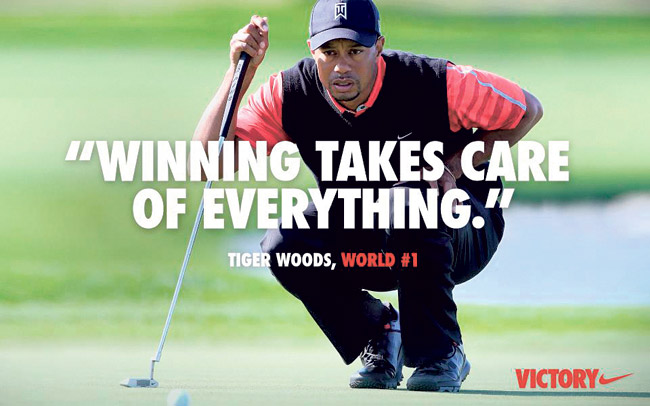Winning: The Fix For All?
Last week’s victory by Tiger Woods in Arnold Palmer’s tournament at Bay Hill propelled Woods back to No. 1 in the world rankings.
Days later, Nike released an ad featuring Tiger crouched over a putt, with huge letters proclaiming, “Winning takes care of everything.” The ad is proving to be as polarizing as Woods himself.
After Woods’ now infamous Thanksgiving incident in 2009, which led to revelations of rampant infidelity accompanied by texts that ranged from sordid to tawdry, Tiger’s $100 million annual endorsement empire took a serious hit.
What seemed to put off much of America the most was that Woods had encouraged the world to believe that he was the ultimate family man, a loving and devoted husband and father, and a model for his fellow citizens.
Some thought this was a private issue between spouses, but many more felt played and betrayed, and sponsors jumped off the listing ship.
But after a difficult period that included rehab from serious injury and surgery, Tiger got his game back. And Nike, one of the sponsors that stayed with Woods, decided to press the advantage. While many in the sports world have noted that winning deodorizes, few trumpet the fact on their own behalf or that of their clients.
The late, great communications and media theorist Marshall McLuhan held that the medium is the message, and others go further down that road by claiming there is no such thing as bad publicity. Certainly the designer of the Nike ad was successful in getting people to talk about it, and maybe it will increase sales. But with so many disgusted by what they see as hubris on the part of Woods and his promoters, could it stop people from buying his product lines?
The American sporting public is notoriously forgiving.
Kobe Bryant has been able to overcome his bad behavior; LeBron James is well beyond his infamous television special departing Cleveland; and Big Ben Roethlisberger past his bad behaviors with women. All have been winners. Who knows, maybe Lance Armstrong will be welcomed back into the public’s good graces in time.
But the Nike folks aren’t waiting for the fullness of time to make their case that Tiger is back and winning, and that’s all that really matters.
If there’s a lesson in all this it’s that Charles Barkley had it right when he announced that he wasn’t and shouldn’t be a role model.
Yes, we continue to imbue our athletic heroes with character traits and virtues that simply don’t hold up to scrutiny.
As my father used to say, “First time, shame on you. Second time, shame on me.”






